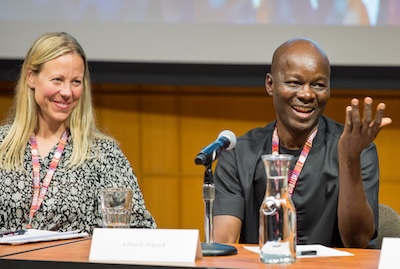 About the Episode
About the Episode
This episode of our special Global Democracy Series features a conversation between Rachel Riedl, professor of international studies at Cornell University, and Joseph Asunka, chief executive officer at Afrobarometer, along with Kellogg PhD Fellow Rasheed Ibrahim on the recent military coups in Sub-Saharan Africa. They analyze the potential long-term consequences of these coups, the role of the military in democratic governance, the decline in citizens' commitment to democracy, and the structural constraints that limit the military's effectiveness in addressing security challenges.
Show Notes
Welcome to Global Stage, a podcast highlighting academic and policy-oriented international research on democracy and human development! Global Stage is brought to you by the Kellogg Institute for International Studies, part of the Keough School of Global Affairs at the University of Notre Dame. Your host today is Kellogg Doctoral Affiliate Rasheed Ibrahim, a PhD student in political science at the University of Notre Dame. In today’s episode, Rasheed welcomes guests Joseph Asunka, the CEO of Afrobarometer, and Rachel Riedl, the Director of Einaudi’s Center and a professor in the Department of Government at Cornell University.
To begin, Dr. Asunka speaks to the recent waves of African coups and what they mean for the continent. He first says the general trend for democracy is declining globally, but there is a distinction between the supply and demand sides. There is a strong support for all institutes of democracy and the demand side is not lacking. Even in the midst of the coups, the popular support for democracy is still very high. The challenge comes on the supply side – the elected leaders aren’t able to meet the aspirations of citizens. The elected leaders aren’t able to deliver and citizens are not satisfied and wish that it would change. Professor Riedl also says that the nine most successful coups in Africa since 2019 had fundamental underlying currents around insufficiency of electoralism and not resolving citizen demands. The coups were meant to provide security and fix the need to provide political order across the territory. There is a relationship between order and liberty, and the coups were justified as a temporary fix or interim solution. There was also an anti-north or anti-western interventionism, along with anti-France views within the coups.
Next, they discuss how to reconcile with the demand of democracy. African people trust the military, but don’t want them to be the ones ruling (65% of the population reject military rule, a majority). The trust in the military is more in the belief of an institution that is disciplined and seen as a moral force that is far beyond the military class. Citizens don’t want an elected leader that will abuse the office. 53% of citizens say the military should intervene if this happens– they trust the military as a temporary change agent, but the hope is that they will return to constitutional rule. The role of the military is often looked to as the solution to the security problem people are facing. Some state forces can also worsen the situation with extremist actions.
The greatest predictors of military coups are the previous coups. Coups – continuation of them –are most likely to occur where there is neither well established democracy nor authoritarian rule. If there is strong democracy or authoritarian rule, then you might be able to avoid this middle ground of the coup trap. There needs to be a greater trust in the judiciary, because if the judiciary isn’t trusted, then the military is the only option. Lastly, Dr. Asunka is hopeful because African people believe in democracy and there is an increase in positivity towards the judiciary. Professor Riedl is hopeful that African people have seen the power of democratic contestation and know the power of their voice.
Links
- Learn more about the 2024 Global Democracy Conference.
- Learn more about Joseph Asunka.
- Learn more about Rachel Beatty Riedl.
- Learn more about the Kellogg Institute for International Studies.
- Learn more about the Kellogg Institute's work for the Notre Dame Democracy Initiative.
Listen
Listen below, ask your smart device to “play Global Stage Podcast,” or find us on:
Apple | Spotify | Stitcher | iHeartRadio | TuneIn | YouTube





